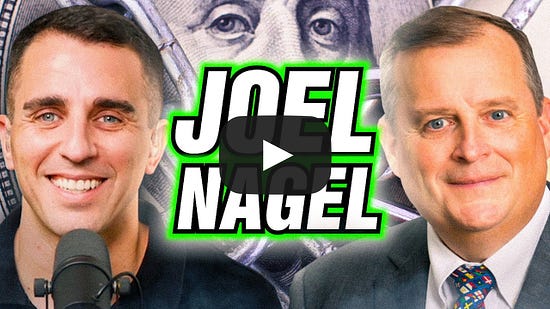|
To investors,
Finance is a confidence game. Everyone from investors to entrepreneurs have to believe that the system works, that players are held to the same standard, and that a buyer of last resort will appear in a moment of crisis.
Central banks have understood this for years. Private banks work diligently to avoid shaking confidence. And individual market participants even wear suits and ties to drive home the message of “trust me…you can trust me!”
But what happens when we lose confidence? Bank runs.
Once the confidence game is up, bank clients will start requesting their funds. If the confidence game of a central bank is exposed, citizens will flee the currency in droves. We have seen these scenarios play out time and again. They are bad. Really, really bad.
It isn’t just legacy finance though.
We have seen the loss of confidence in the crypto industry too. The most recent example was FTX, which triggered billions of dollars of withdrawal requests. Some people were able to get their money out, while others were too slow and FTX paused withdrawals. Once the bank run starts, companies don’t have very many options.
You can read about the FTX situation in detail elsewhere. Many journalists are doing a good job of keeping us informed of the latest developments. I am more interested in an even larger question:
What happens if an industry begins to lose the confidence game?
The “crypto industry” was originally just the bitcoin industry. This was the case from 2009 to approximately 2014. Since then, there have been tens of thousands of crypto assets created and launched. Bitcoin remains the king, but plenty of others were able to gather attention and capital.
As the industry got bigger, and more sophisticated players got involved, there was an air of legitimacy that began to fill the room. Institutional investors. Billionaire hedge fund managers. Daily coverage on financial news television shows. Celebrities and athletes. Arena naming rights. Big conference parties at fancy locations.
It was the greatest show the digital world had ever seen.
But almost all of it was bullshit. Almost every single token will eventually be worthless. There are nearly 0 mainstream users outside of the echo chamber of crypto.
What else did you expect from an industry that openly talked about “ponzinomics”? Or an industry that named assets like they were 4 years old and had just learned to read a coloring book? Or people who were explicitly trying to create fake assets out of thin air?
The “crypto industry” got cocky and now the largest capital pools in the world know the industry isn’t ready for showtime.
Throughout all the noise, and without any outside capital investment, Bitcoin has continued to shine for nearly 15 years. It has completely separated itself from the crypto industry. The digital currency is actually decentralized. It is actually used by ~ 200 million people around the world. Bitcoin has the strongest computing network in the world — one of the single greatest engineering feats in human history — securing and supporting it.
When the confidence game is over for the crypto industry, the market comes back to bitcoin.
There is nowhere else to flee. There is no bank run on bitcoin. In times of chaos and uncertainty, people want confidence and security.
Bitcoin provides that confidence.
There are bitcoin maximalists being born every minute right now. There are newly converted self-custody users popping up left and right. People are no longer asking “how high can X go,” but instead asking “how confident am I that bitcoin will last for Y years?”
This is a natural part of the cycle. In our darkest moment, bitcoin steps to the forefront. It provides the solution. It solves the confidence crisis. Block-after-block of transactions. The digital payment network continues to provide a long-term oriented savings technology that affords anyone in the world the opportunity to protect their purchasing power over decades.
And yes, some of you will start screaming “but bitcoin’s price is down too!!!” You are right. Every asset is down as the Federal Reserve continues to create tighter financial conditions and destroy demand. The Fed may not have been successful yet in bringing inflation under control, but it sure is doing a great job bringing asset prices down.
If you can ignore the price and simply look at the underlying fundamentals — bitcoin continues to grow stronger. People are using it. Hash rate is hitting all-time highs. On-chain bitcoin addresses with 0.1 and 0.01 bitcoin continue to hit all-time highs. The asset is becoming more decentralized and stronger. It is gaining more global adoption.
And the monetary policy hasn’t blinked once.
There was no random change during the government lock downs of 2020. There was no change during the liquidity crisis of March and April 2020. There was no change during the following asset bubble. There was no change when the Fed changed course. There was no change when 3AC and Celsius fell. There was no change when FTX came under pressure, nor was there a change when the price fell further and further in recent days.
Bitcoin does not care.
It produces blocks of transactions for anyone in the world to access. Send and receive economic value with anyone who has an internet connection without needing permission from a third-party. The promise of peer-to-peer electronic cash is still alive and well.
Bitcoin is winning the confidence game. We must remember why we are here.
-Pomp
Joel Nagel is a Managing Partner and Founder of the international law firm Nagel & Associates LLC.
In this conversation, we discuss asset protection, estate planning, managing your Bitcoin, tax mitigation, and all the ways you can protect your wealth as you go through life.
Listen on iTunes: Click here
Listen on Spotify: Click here
Earn Bitcoin by listening on Fountain: Click here
How To Protect Your Assets With An Estate Plan

Podcast Sponsors
These companies make the podcast possible, so go check them out and thank them for their support!
Alto IRAcan help you invest in crypto in tax-advantaged ways to help preserve your hard earned money. There are no setup or account fees, and it’s all you need to do to invest in crypto tax free. Open an Alto CryptoIRA to invest in crypto tax-free by clickinghere.
Eight Sleep is the most advanced solution on the market for thermoregulation by pairing dynamic cooling and heating with biometric tracking. Click here to check out the Pod Pro Cover and save $150 at checkout.
Amberdata provides the critical data infrastructure enabling financial institutions to participate in the digital asset class. We deliver comprehensive data and insights into blockchain networks, crypto markets, and decentralized finance. Download our Digital Asset Data Guide here today.
SiGMA is the bridge between iGaming, online sports betting, and emerging technology, such as Blockchain, NFTs, fintech, GameFi, metaverse, and AI, is loud and clear. The largest global summit of this kind is heading to Malta from November 15 to 17. Log on to AIBC.WORLD or SiGMA.WORLD to see all our upcoming global summits!
Bullish is a powerful exchange for digital assets that offers deep liquidity, automated market making, and industry-leading security. Click here to learn more.
Valour represents what’s next in the digital economy -- providing simplified, trusted access to crypto, decentralized finance and Web 3.0 investment opportunities. For more information visit valour.com
Unstoppable Domains’ 10 NFT domain endings are now fully integrated with Trust Wallet. Claim your Unstoppable Domainhere today.
Compass Mining is the world's first online marketplace for bitcoin mining hardware and hosting. Visit compassmining.io to start mining bitcoin today!
LMAX Digitalis the market-leading solution for institutional crypto trading & custodial services. Learn more at LMAXdigital.com/pomp
Exodus is the world’s leading desktop, mobile, and hardware crypto wallets, with over 150 assets. Founded in 2015 to empower people to control their wealth. Visit http://exodus.com/pomp today.
You are receiving The Pomp Letter because you either signed up or you attended one of the events that I spoke at. Feel free to unsubscribe if you aren’t finding this valuable. Nothing in this email is intended to serve as financial advice. Do your own research.
You’re a free subscriber to The Pomp Letter. For the full experience, become a paid subscriber.

